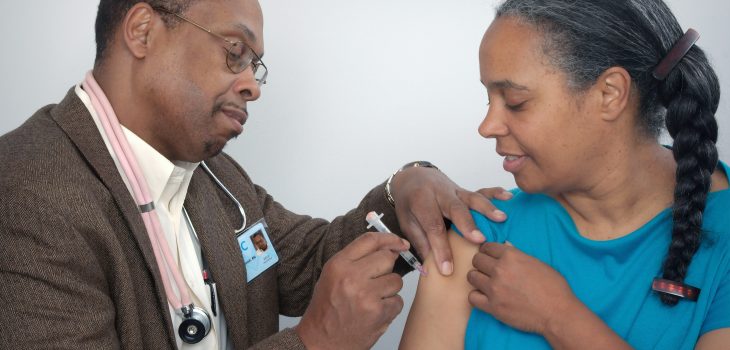By Michelle Udoh (LSHTM MSc student in Global Mental Health)
Cultural competence training must be delivered to all persons involved with the delivery of the programme, to minimise the repercussions that racist attitudes and behaviours have on minority ethnic communities.”
The concentrated and collaborative efforts of governments and various stakeholders across the world have led to the rapid development of the COVID-19 vaccine. It has been hailed as one of the greatest achievements in science, laying the foundations for future vaccine development. However, 72% of Black African and Afro-Caribbean groups are hesitant to get the vaccine. While this study suggests that the vaccine has become the object of suspicion and scrutiny, this reluctance is not specific to the COVID-19 vaccine alone. Research has shown that, on average, Black people are less likely to be vaccinated compared to white British nationals. As Black communities continue to be impacted by the disproportionately higher morbidity and mortality rates experienced during the pandemic, and the UK government relies on mass vaccination to usher the country into herd immunity, it becomes increasingly clear that vaccine mistrust needs to be appropriately and effectively addressed.
Taking a ‘people-centredness’ approach to this problem
Originating in Paulo Freire’s theories and works on critical pedagogy, people-centredness strives to recognise the humanity within health systems. It asserts that health outcomes are better achieved when the needs and voices of people are put first, shifting the focus away from the disease itself.
In some ways, the UK has made notable steps towards a people-centred health system. In response to the vaccine hesitancy within minority ethnic groups, the initial approach to the vaccine delivery plan was adjusted. For example, to overcome potential language barriers, communications surrounding the vaccine are now available in more than 13 languages. The updated programme also includes more engagement with community leaders, as well as providing mobile vaccination services to those who are physically unable to access their GP.
Despite these advancements, people-centredness is something that has still not been fully achieved. This is because it requires the government, health care providers, policymakers and everyone involved with service delivery to view COVID-19 through a much broader lens: acknowledging the way that social inequalities, such as poor housing conditions and low income, exacerbate the burden of this disease. It requires an admission that these inequalities are generated by institutions, policies and legislations. And this is something that the UK government has yet to do.
Structural racism remains a significant issue
Many official government publications have investigated and recognised the racial health disparities that have been compounded during the pandemic. Yet these reports lack the critical analysis and depth that predicates the upheaval of institutionalised racism – particularly the most recent Commission on Race and Ethnic Disparities, which claimed that the UK should be regarded as a model for other countries with a majority white population. Without listening to and centring the voices and experiences of minority ethnic groups, there is a chance that these vaccine interventions will fail to wholly tackle the structural determinants that underlie racial health disparities, and consequently uphold vaccine mistrust. We are currently seeing this happen, as Black people in the over 70s category still have the lowest vaccine uptake rate, despite the newly-adjusted vaccine delivery programme.
Historically, health systems in high-income countries such as the UK have repeatedly demonstrated that Black health is not a priority. In the past, this took form in racist beliefs, such as the idea that Black people have less sensitive nerve endings than white people, which was used as a justification for the numerous surgical experiments that were administered on enslaved Black people without anaesthesia. Today, these racist beliefs continue to permeate health systems, perpetuating racial bias of healthcare professionals, neglect of Black patients and increased mortality rates.
This must be considered in the government’s vaccine delivery plan as increased accessibility does not prevent implicit bias and could even expose more communities to these harmful attitudes.
There is so much that needs to be done
A key challenge is that the voices of Black groups are often underrepresented in healthcare research. Pfizer’s vaccine was trialled in predominantly white populations, with 9.8% of participants identifying as African American, compared to 81.9% of their white counterparts. Participatory action research (PAR) provides a solution to this. It is an approach to research that is designed to enable both researchers and participants to work alongside each other to understand a situation that affects the participants’ communities. PAR would also help to reduce racist objectification of individuals within the studied community, as well as allowing participants to be empowered with the knowledge they need to take charge of their health, and the health of their communities. In this context, it involves employing Black healthcare role models, religious and community leaders, as both viable sources of information and trusted liaisons between the government, researchers and hesitant communities.
It is important that these considerations extend beyond the pandemic. Even if vaccine uptake within Black communities is increased, the vaccine will not protect against systemic racism, which is a public health crisis in itself. A people-centredness approach, accompanied by PAR which enables affected communities to create and co-lead policies and programmes is a strategy that should be implemented within the UK’s health system.
This means policies addressing working wages and benefits to reduce socioeconomic inequities and looking at policies surrounding student and staff retention rates of Black and minority ethnic groups. Revision of existing discrimination policies within the workplace, within schools and healthcare need to take place – along with implementation of zero tolerance policies. Additionally, it entails looking at policies that facilitate a welcoming environment for refugees and asylum seekers, allowing them to fully access the national health services with ease.
Healthcare is a fundamental right that everyone should have. This principle should and must uphold, not only the delivery of the COVID-19 vaccine, but health research and policymaking in the future.











